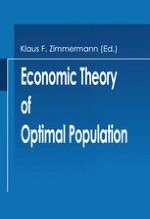1989 | OriginalPaper | Buchkapitel
Socially Optimal Population Size and Individual Choice
verfasst von : Marc Nerlove, Assaf Razin, Efraim Sadka
Erschienen in: Economic Theory of Optimal Population
Verlag: Springer Berlin Heidelberg
Enthalten in: Professional Book Archive
Aktivieren Sie unsere intelligente Suche, um passende Fachinhalte oder Patente zu finden.
Wählen Sie Textabschnitte aus um mit Künstlicher Intelligenz passenden Patente zu finden. powered by
Markieren Sie Textabschnitte, um KI-gestützt weitere passende Inhalte zu finden. powered by
Since Becker’s (1960) analysis, the implications of endogenous fertility in the sense of parental altrusim towards their own children, for consumption, labor supply and household unemployment decisions have been explored extensively in the literature. The purpose of this paper is to examine the general equilibrium implications of endogenous fertility for a number of social issues of population policy. We are thus concerned with the normative rather than the positive implications of endogenous fertility. In our analysis, we adopt the simplest possible formulation: In addition to their own consumption, the number of children and the utility of each child is assumed to enter the utility function of the parents. Thus, subject to whatever economic opportunities and constraints they face, parents are assumed to maximize their own utility functions (one per couple) in making choices with respect to numbers of children and investments in them. Noncoersive tax and subsidy policies may be devised to affect these decisions; in the absence of such policies, a laissez-faire solution will generally exist. We ask first whether the laissez-faire solution will be efficient from the standpoint of the present generation, that is, whether individual choice in the absence of social intervention will lead to a Pareto-optimal solution. We next introduce the notion of an intergenerational social welfare function and ask whether laissez-faire leads to a social optimum under various criteria and, if not, what non-coercive social policies may be introduced to achieve one.
